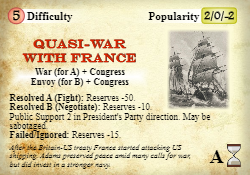
President Adams

The Quasi War

President Adams
|
War Hawks I
Diplomatic outrages followed. France refused to receive Charles C.
Pinckney, the new ambassador and later agreed to receive
Pinckney and envoys John Marshall and Elbridge Gerry only if healthy
bribes were paid. Now it was the turn of Americans to be outraged,
especially as Secretary of State Timothy Pickering reported that in
eleven months France had seized 361 American ships.
Alexander Hamilton and many others were all for going to war with
France and a kind of war fever ran through the nation, particularly
in the north. Pickering and the Attorney General both urged war.
Little trusting would-be army commander Hamilton,
President Adams made a case for building up a strong navy, created a
Navy Department and went from everyone's favorite scapegoat to virtual
national hero status. In further developments,
Congress authorized attacks on French warships and passed the
xenophobic Alien and Sedition Acts that restricted the movements of
foreigners and speech critical of the government. It appeared a full war was
imminent.
But President Adams held off the War Hawks. Through American diplomats
in the Netherlands, he continued to pursue peace and in 1799 this bore
fruit as new envoys were received and eventually the result was the
Treaty of Mortefontaine, which ended hostilities. But Adams'
popularity was never again what it had been; partly this was due to
the draconian Sedition Act, but had he managed to have a decent
showing in a war, he probably would have been re-elected in 1800,
Sedition Act or no; instead he saved many American lives and became
the first one-term president.
Those who in 2003 extolled the two centuries of friendship
between France and the United States evidently forgot that the two
once nearly went to war. The year was 1798 and the President John
Adams. Although France had famously helped during the revolution, in
1794 three events occurred to threaten the friendship. First, the
citizens of France toppled their monarchy and came into conflict with
Great Britain, and third, the United States
reached agreement with Britain – the Jay Treaty – to stop
British attacks on American shipping.
When in 1798 the United States and President Adams – no friend to this
revolution – refused to continue repaying its debt, the French
were outraged and commissioned privateers to attack American shipping,
beginning what is now known as the Quasi-War with France.
Created: 22 December 2014